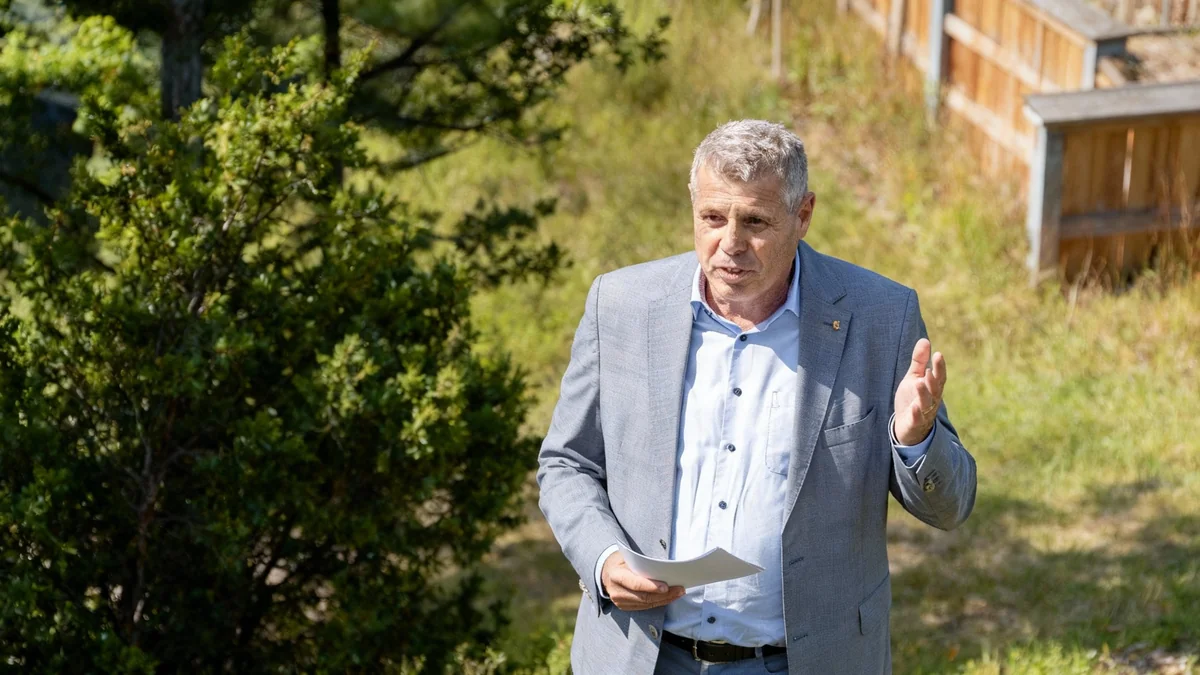The Swiss pharmaceutical industry faces significant challenges following the United States' decision to impose 100 percent tariffs. This move by the US government has raised concerns across Switzerland, particularly in Basel, a key hub for pharmaceutical companies. The tariffs are expected to intensify existing pressures on Swiss drug manufacturers and could lead to shifts in global production strategies.
Key Takeaways
- US imposes 100 percent tariffs on Swiss pharmaceutical products.
- Swiss government held a crisis summit with industry leaders.
- Basel, a major pharma hub, is actively lobbying for its industry.
- Concerns exist over production relocation and global drug pricing.
- Swiss politicians call for a national pharmaceutical strategy.
New Tariffs Impact Swiss Pharmaceutical Sector
Hopes for a quick resolution in the trade dispute with the United States were dashed on Friday morning. Instead of a sign of easing tensions, Switzerland received concerning news: US President Donald Trump announced 100 percent tariffs on the Swiss pharmaceutical industry. This decision marks a significant escalation in trade relations.
The announcement follows a period of uncertainty. Approximately 59 days earlier, President Karin Keller-Sutter had a critical phone call with Trump, which led to the initial 39 percent tariff announcement. This earlier declaration had already caused considerable shock within Switzerland, a nation proud of its economic stability and global trade partnerships.
Swiss Government Responds to Industry Concerns
On September 22, the Federal Council convened a crisis summit at the Bernerhof. The meeting brought together 26 top representatives from Swiss pharmaceutical companies and industry associations. Among the attendees were Lukas Engelberger, Basel's Health Director, and Kaspar Sutter, Basel's Economy Director, both aged 50.
Basel, known as a major pharmaceutical center, is actively working to protect its industry. The national government has not agreed to the industry's demand for higher domestic drug prices. However, following the round table discussion, the Federal Council affirmed its commitment to the pharmaceutical sector.
"We have a common goal: to strengthen the industry in Switzerland," stated Interior Minister Elisabeth Baume-Schneider (61) to the media, highlighting the government's support.
Developing a National Pharmaceutical Strategy
The Federal Council's recent stance marks a change from earlier in September. At that time, it had rejected a motion by Basel SP State Councillor Eva Herzog (63) for a national pharmaceutical strategy. Herzog's motion called for the government to "develop and implement a strategy to strengthen Switzerland as a pharmaceutical and biotechnology location." Despite the Federal Council's recommendation to reject it, the Council of States unanimously approved the motion during the autumn session.
Key Fact
The pharmaceutical and life sciences sector contributes significantly to Switzerland's economy, representing a large portion of its added value and tax revenue.
Another motion, proposed by Basel National Councillor Patricia von Falkenstein (64, LDP), also advocating for a location strategy for the Swiss pharmaceutical and life sciences sector, was similarly rejected by the Federal Council initially. However, the growing pressure from US tariffs has likely influenced the Federal Council's renewed focus on the industry.
Political Perspectives on Industry Challenges
Eva Herzog emphasized the need for a comprehensive view of the pharmaceutical industry.
"We need a holistic view of the pharmaceutical industry," Herzog stated. "There are strategies for the financial sector, but not for pharma, even though it contributes significantly to Switzerland's value creation."
Unlike the industry association Interpharma, Herzog does not advocate for higher drug prices to strengthen Switzerland as a business location. Instead, she highlights other critical factors. "It is crucial that innovative medicines are approved faster. Delays in approvals harm clinical research, innovation, and Switzerland's research location," she explained.
Background on Trade Tensions
The current tariff dispute is part of a broader trade conflict initiated by former US President Donald Trump. His administration previously imposed a 39 percent tariff on Switzerland, leading to intense negotiations. The latest 100 percent tariff on pharmaceuticals adds another layer of complexity to these ongoing discussions.
Uncertainty Regarding Tariff Exemptions
Regarding the new US pharma tariffs, Herzog advised patience. "Much is still unclear," she noted. For example, it is uncertain if major companies like Novartis and Roche will be exempt. These companies already produce and invest heavily in the United States. Herzog believes Trump's tariffs are accelerating an existing trend: producing within target markets. "Trumps tariffs reinforce a development that is already underway, production in the markets," she said.
Herzog expressed greater concern about international drug pricing trends than about the relocation of production. "If these prices are massively reduced, pharma companies will lose revenue. Switzerland will feel this impact on research investments and tax revenues," she warned.
Basel's Enduring Appeal and Future Outlook
Herzog does not believe that Basel faces a threat of Roche and Novartis relocating their headquarters. Legal certainty and stability remain strong arguments for the city. However, she stressed that Basel must maintain its attractiveness to continue drawing investment.
Kaspar Sutter, Basel's Government Councillor, offered a more critical view on the relocation of production abroad. "Donald Trump's announcement is not good for Switzerland's production location, as it reinforces the trend for the US market to increasingly produce directly in the USA," Sutter explained. He added that Switzerland's research and innovation hub is not immediately affected.
Basel's Strengths
- Stable regulatory environment
- Legal certainty
- Highly qualified workforce
- Academic freedom
- Excellent infrastructure
Sutter emphasized Basel's strong position. "Basel-Stadt offers stable conditions, legal certainty, qualified professionals, scientific freedom, and excellent infrastructure. Basel's location package contributes significantly to this," he said. He highlighted the importance of Basel remaining attractive for the research and development segments of pharmaceutical companies.
Sutter also called on the federal government to act decisively. He stated that Bilateral III agreements must be implemented to secure access to the EU, Switzerland's most important trading partner. "Furthermore, I expect the federal government to develop a strategy for Switzerland's life sciences sector, as demanded by the motions from Herzog and von Falkenstein," he concluded.
Ongoing Diplomatic Efforts
The entire situation unfolds against the backdrop of an ongoing tariff dispute that began with Trump's 39 percent tariff announcement. The Swiss government has reportedly submitted an improved offer for a trade deal to the Americans. According to sources, US Trade Representative Jamieson Greer (45) and Treasury Secretary Scott Bessent (63) have already given their approval. The main resistance reportedly comes from Commerce Secretary Howard Lutnick (64), known as a strong Israel lobbyist in Trump's cabinet. Lutnick was also involved in past disputes concerning unclaimed assets and recently accused Switzerland of enriching itself at America's expense.
Switzerland now awaits a decision from the US President. Since the initial 39 percent tariff announcement, all parties understand that the outcome depends solely on Trump's disposition. While Economy Minister Guy Parmelin (65) and the industry work to preserve Switzerland's pharmaceutical sector, and diplomats pursue a tariff deal, Bern and Basel eagerly anticipate the moment when the US President reviews the "Switzerland" dossier. This decision could come at any time, reflecting the unpredictable nature of the White House's 'one-man show'.




